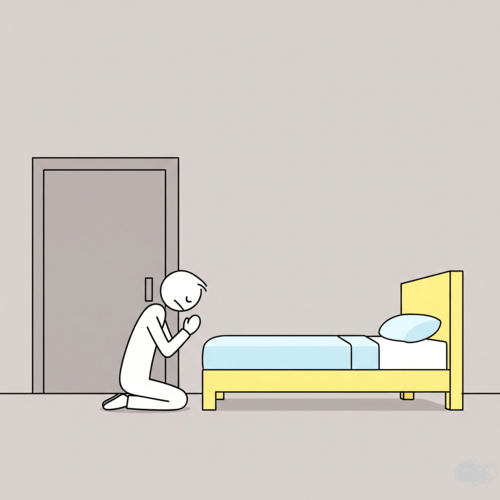What Does ‘Pray In Secret’ Mean?
UNDERSTANDING JESUS’ COMMAND IN MATTHEW 6
“But when you pray, go into your room and shut the door and pray to your Father who is in secret. And your Father who sees in secret will reward you.” — Matthew 6:6
At first glance, Jesus’ command to pray in secret seems puzzling. If prayer is good, why hide it? And doesn’t Paul tell us to “pray without ceasing” (1 Thessalonians 5:17) and “pray everywhere” (1 Timothy 2:8)? Are these teachings at odds with each other?
The answer lies in understanding what Jesus was really addressing—and it’s more relevant to our social media age than we might think.
THE HEART BEHIND THE COMMAND
When Jesus spoke these words in the Sermon on the Mount, He wasn’t condemning all public prayer. Instead, He was exposing a deadly spiritual disease: using prayer as performance art.
The religious leaders of His day had turned prayer into theatre. They strategically positioned themselves at busy street corners and prominent spots in synagogues, timing their prayers for maximum visibility. Their goal wasn’t communion with God—it was applause from people.
Jesus calls them exactly what they were: hypokrites—actors playing a role (Matthew 6:5).
WHAT “IN SECRET” REALLY MEANS
The Greek word Jesus uses for “room” is tamieion—an inner chamber or storeroom, the most private space in a house. This isn’t just about physical location; it’s about spiritual posture.
When Jesus says “shut the door,” He’s creating a picture of intimate, unobserved communion with God. No human audience. No possibility of applause. Just me and my heavenly Father.
Why does this matter? Because secret prayer strips away every motive except one: genuine relationship and communion with God.
THE PROMISE THAT CHANGES EVERYTHING
Notice Jesus doesn’t just give a command—He adds to it a promise: ”Your Father who sees in secret will reward you” (Matthew 6:6).
This isn’t about earning God’s favour through hidden good works. It’s about God’s gracious response to authentic devotion. The Father who sees all things takes special notice of the heart that seeks Him without pretence.
The reward isn’t always immediate or material. Sometimes it’s simply the privilege of knowing God more deeply. Sometimes it’s spiritual growth that happens away from public gaze. And always, it’s the assurance that nothing we do in faithful obedience to Christ goes unnoticed by our loving Father.
RECONCILING SECRET PRAYER AND CONSTANT PRAYER
So how do we square Jesus’ command with Paul’s instruction to “pray without ceasing”? The key is in understanding they address different aspects of our prayer life:
Jesus is talking about formal, deliberate times of prayer—those moments when we set aside everything else to focus entirely on God. These times, He says, should be free from human observation and the temptation to perform.
Paul is talking about our continuous spiritual posture—living in constant dependence on God, maintaining an attitude of prayer throughout the day. Every day.
Both are essential. Both are biblical. The difference is motivation and context.
Consider Jesus Himself: He regularly withdrew to private places to pray (Luke 5:16, Mark 1:35), yet He also prayed publicly, as at the Last Supper (John 17) and blessed food before crowds (Matthew 14:19). The key was always His heart motive—genuine communion with the Father, never self-promotion.
WHY THIS MATTERS MORE THAN EVER
In our Instagram-everything culture, Jesus’ words cut deeper than ever. We’re tempted to broadcast our spiritual lives, sharing our “quiet time” insights and documenting our devotional practices. Social media has created new “street corners” where spiritual performance can masquerade as authentic faith.
Jesus’ command protects us from turning even our relationship with God into content for human consumption.
THE TEST OF TRUE PRAYER
Here’s a diagnostic question that reveals the condition of our hearts: If no one would ever know about it, would we still pray?
If our prayer life depends on others knowing about it—through our posts, our public prayers, or our spiritual conversations—then we’ve missed Jesus’ point entirely. We’re praying to the wrong audience.
True prayer happens when we’re alone with God, beyond the reach of human observation or approval. It’s there, in the secret place, that our relationship with God becomes real rather than performed.
PRACTICAL STEPS FORWARD
- Let’s establish a private place for prayer. Perhaps it’s a physical space where we can be alone with God—a corner of our bedroom, a chair in our living rooms, or even in the car. Let’s make it your regular meeting place with the Father.
- Let’s guard our motives in public prayer. When opportunities arise to pray publicly—in small groups, at church, or family meals—may we remember to examine our hearts. Are we focused on God or on how others perceive our spirituality?
- Let’s keep some prayers completely private. Let’s learn to resist the urge to share every spiritual insight or answered prayer. Let some of our communion with God remain just between us and Him.
- Let’s test our social media habits. Before posting anything spiritual, let’s ask: “Am I sharing this to encourage others or to showcase my own spirituality?” Honest answers reveal honest hearts.
THE SECRET PLACE IS SACRED SPACE
Jesus’ teaching on secret prayer isn’t about hiding from the world—it’s about finding authentic connection with God. In the secret place, pretence dies and real relationship begins.
The Father sees what happens in secret. He knows when we struggle to pray, when words don’t come, when we simply sit in His presence. He sees our tears, our doubts, our desperate pleas for help. And He responds—not because we’ve earned His attention through spiritual performance, but because He delights in the hearts that seek Him sincerely.
Corporate prayer and public worship remain vital parts of Christian life. But they’re most powerful when they flow from hearts already familiar with the secret place—hearts that know God intimately, not just publicly.
The invitation stands: Our Father gently nudges us to close the door. Now. To meet with Him in secret. To discover what happens when prayer becomes conversation rather than performance, when communion replaces competition.
“But seek first the kingdom of God and his righteousness, and all these things will be added to you.” — Matthew 6:33
WHAT DOES ‘PRAY IN SECRET’ MEAN? RELATED FAQs
What do Bible scholars say about their personal experience with secret prayer? Sinclair Ferguson describes secret prayer as “the gymnasium of the soul,” where believers develop spiritual muscle away from public view. Tim Keller noted his most transformative prayers happened in solitude, where he could be brutally honest with God without concern for appearances. John Piper emphasises secret prayer taught him the difference between praying about God and praying to God—the latter only happens when human audiences disappear.
- Does “closing the door” mean we can never pray with our spouse or family present? Not necessarily. The “closed door” principle applies to removing any audience that might tempt us toward performance, not eliminating all human presence. Many couples find praying together privately deepens both their marriage and their individual prayer lives, as long as both are genuinely seeking God rather than impressing each other. The key test remains: are we praying to God or for each other’s approval?
- How does secret prayer relate to corporate fasting and other spiritual disciplines Jesus mentions in Matthew 6? Jesus applies the same “in secret” principle to giving (v.3-4) and fasting (v.16-18), revealing a comprehensive approach to spiritual authenticity. Reformed theology sees these as mutually reinforcing: secret disciplines prepare our hearts for authentic corporate worship, while corporate worship reminds us why private disciplines matter. RC Sproul called this the “rhythm of the Christian life”—private preparation enabling public participation.
What about Jesus’ promise that “where two or three are gathered, I am there” (Matthew 18:20)—doesn’t this contradict praying alone? Matthew 18:20 addresses church discipline and corporate discernment, not general prayer principles. Both truths coexist beautifully: Christ meets us in solitude (Matthew 6:6) and in community (Matthew 18:20). Secret prayer actually enhances corporate prayer by ensuring we bring authentic hearts to communal worship rather than performing for the group. Many believers report their private prayer life directly improves their participation in corporate prayer.
- How do we handle children and the reality that families often pray together—should kids also pray in secret? Family prayer serves a different purpose than secret prayer—it’s discipleship and corporate worship in miniature. Children should experience both: learning to pray with family (modelling and teaching) and developing their own secret prayer habits as they mature. Parents often find teaching children about secret prayer actually reduces the tendency to “show off” during family prayer times, making both more authentic.
- What encouragement do believers give about the “dryness” or difficulty sometimes experienced in secret prayer? Reformed testimonies consistently emphasise difficulty in secret prayer is often where the deepest growth occurs. John Owen wrote secret prayer reveals our true spiritual condition—sometimes uncomfortable but always necessary. Modern Reformed believers report pushing through “dry seasons” in private prayer often preceded their most significant spiritual breakthroughs. The key insight: God meets us in secret even when we don’t feel His presence, and persistence in private prayer trains us to depend on His faithfulness rather than our feelings.
How do technology and smartphones affect our ability to truly pray “in secret”? Reformed believers now treat their phones like the “hypocrites” Jesus warned against—constant sources of external validation that intrude even into prayer. Pastors like John MacArthur recommend creating truly offline sacred spaces, noting that secret prayer requires not just physical privacy but mental quietness impossible with digital distractions. The discipline of putting phones away during prayer time has become, for many believers, as important as closing the literal door Jesus mentioned.
WHAT DOES ‘PRAY IN SECRET’ MEAN? OUR RELATED POSTS
Editor's Pick

GPS Without Eyes: How Ants Silently Shout Intelligent Design
Picture a leafcutter ant navigating the rainforest floor in pitch darkness, carrying a leaf fragment 50 times its body weight. [...]

Born Broken: Why Must We Affirm Original Sin?
Imagine a world where we’re born neutral—free to choose good, and without a bias toward evil. Sounds appealing… until we [...]

Does God Truly Care About My Everyday Choices?
OWe believe God created the universe. We believe He orchestrated the exodus from Egypt and raised Jesus from the dead. [...]
SUPPORT US:
Feel the Holy Spirit's gentle nudge to partner with us?
Donate Online:
Account Name: TRUTHS TO DIE FOR FOUNDATION
Account Number: 10243565459
Bank IFSC: IDFB0043391
Bank Name: IDFC FIRST BANK






